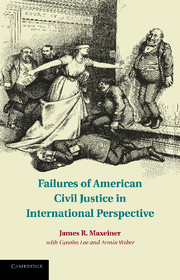Preface
Published online by Cambridge University Press: 07 September 2011
Summary
Preface
It is easier to criticize than to reform.
Fleming James, Jr., Geoffrey C. Hazard, Jr., and John Leubsdorf, Civil Procedure 119 (5th ed. 2001)Why don’t you take advantage of what has been done by the civil law, that governs at least twice as many people as the common law, is two thousand years older, and embodies a much greater amount of human experience?
Pierre Lepaulle (1929), Pioneering French international lawyer, on judicial procedure in America, as quoted by Edson R. SunderlandLitigation is merely a means to an end, like transportation, and the same tests should apply to both. No American objects to the use of the Diesel engine because it is of German origin, nor to the radio because it is Italian, and the victims of rabies make no protest against the employment of Pasteur’s treatment because it was developed in France. In every field of human activity outside of the law men are constantly searching for new and better methods, overcoming the barriers of language and forgetting the prejudices of nationality and race.
Professor Edson R. Sunderland (1929), principal drafter of the pretrial provisions of the Federal Rules of Civil Procedure (1938)It may be the oldest use of comparative law: You want to fix something at home that does not work well. You look next door to see how your neighbor does it.
In our book the subject of neighborly inquiry is civil justice. That American civil justice does not work well is recognized worldwide. Those subject to it were among the first to complain, but today many American lawyers, law professors, and judges will tell you the same thing.
- Type
- Chapter
- Information
- Failures of American Civil Justice in International Perspective , pp. xvii - xxivPublisher: Cambridge University PressPrint publication year: 2011
- 1
- Cited by



